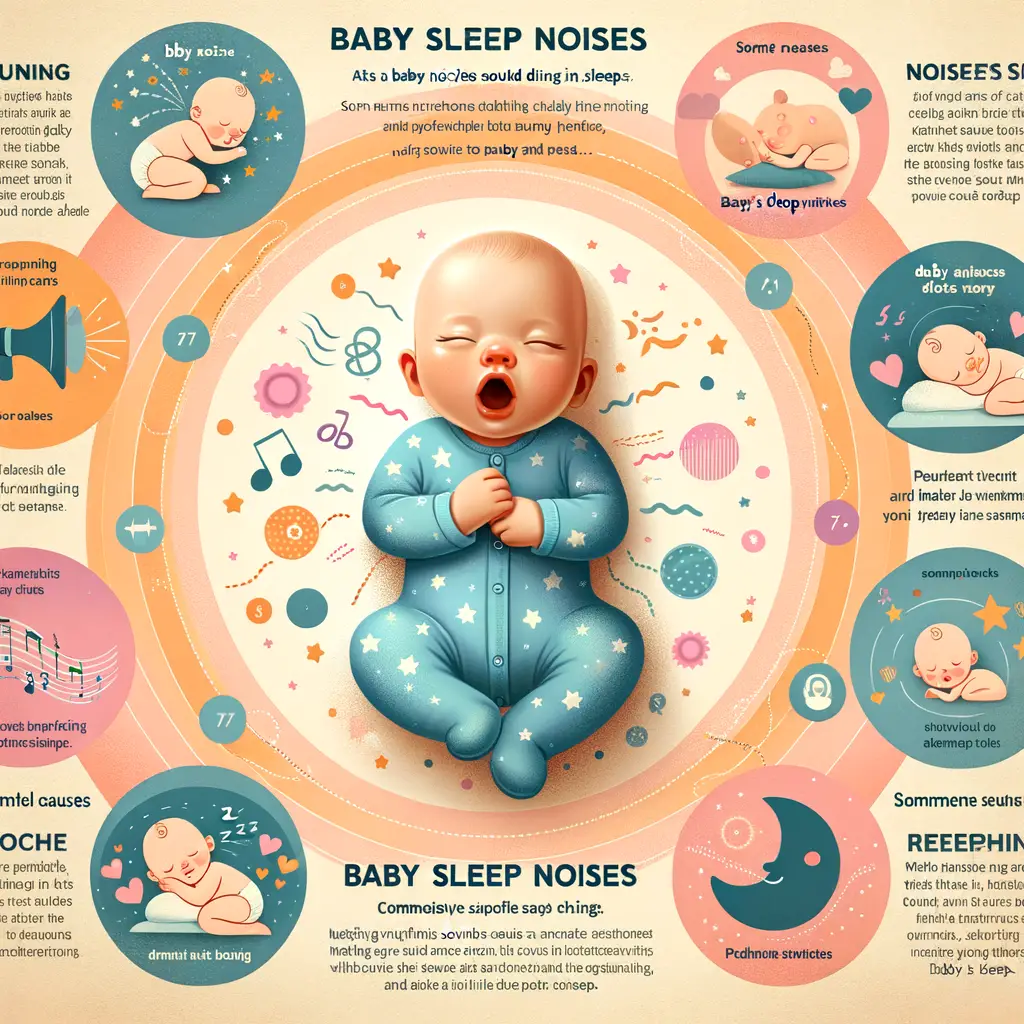Introduction to Baby Sleep Noises
When you first bring your baby home, you might be surprised by the variety of sounds they make in their sleep. From grunts and whimpers to snorts and gurgles, these noises can be quite puzzling. In this post, we’ll explore the world of baby sleep noises, helping you understand what’s normal and why it’s important to monitor your baby’s sleep patterns.
Understanding the normalcy of baby sleep noises
Firstly, it’s important to know that most baby sleep noises are completely normal. Babies have smaller, narrower airways than adults, which can lead to a wider range of sounds. Plus, they spend more time in rapid eye movement (REM) sleep, which is when dreaming occurs and when some of the more unusual sleep sounds can happen. REM sleep is a crucial part of your baby’s brain development, so these noises are a sign that their body is functioning as it should.
Importance of monitoring baby sleep patterns
While most baby sleep noises are normal, it’s still important to monitor your baby’s sleep patterns. Changes in their sleep sounds could indicate a health issue, like a cold or an ear infection. Plus, understanding your baby’s typical sleep patterns can help you identify when something is off. For example, if your usually quiet sleeper suddenly starts making a lot of noise, it might be a sign that they’re not feeling well. By keeping a close eye on your baby’s sleep, you can ensure they’re healthy and happy.
In the following sections, we’ll delve deeper into the different types of baby sleep noises, what they mean, and when you should be concerned. We’ll also share some case studies to help you better understand baby sleep behavior. So, let’s embark on this journey of understanding and embracing the noises of baby sleep.
Decoding Baby Sleep Sounds
Understanding your baby’s sleep sounds can be a fascinating and sometimes puzzling experience. Let’s explore some of the most common baby sleep noises and what they might mean.
Common Baby Sleep Noises
There are several sounds that babies often make during sleep. Here are the most common ones:
Baby Snoring
Snoring in babies is quite common and usually harmless. It can be caused by a stuffy nose or a slight blockage in the airway. However, if your baby’s snoring is loud or they seem to be struggling to breathe, it’s best to consult a pediatrician.
Baby Grunting While Sleeping
Grunting can often be heard when a baby is in a deep sleep. This is due to the baby’s immature nervous system. As your baby grows and their nervous system matures, this grunting should decrease.
Other Baby Breathing Noises
Babies can make a variety of other sounds while sleeping, including whistling, gurgling, and squeaking. These sounds are usually caused by the baby’s small, narrow airways and are typically nothing to worry about. However, if you notice any changes in your baby’s breathing patterns or if they seem distressed, it’s always a good idea to seek medical advice.
Remember, every baby is unique and may make different sounds while sleeping. It’s important to get to know your baby’s normal sleep sounds so you can identify any changes that might need medical attention.
What These Sounds Mean
As a parent, it’s important to understand the various sounds your baby makes while sleeping. Let’s take a closer look at what these sounds mean.
Interpreting baby snoring
While it might seem unusual, baby snoring is quite common. It can be caused by a stuffy nose or a cold. However, consistent and loud snoring could be a sign of a more serious condition like sleep apnea. If you notice this, it’s advisable to consult a pediatrician. Learn more about baby snoring here.
Understanding baby grunting while sleeping
Baby grunting, especially during deep sleep, is usually normal. It’s often a sign that your baby is trying to pass stool or gas. However, if the grunting is accompanied by other symptoms like difficulty breathing, it’s important to seek medical advice. Find more about baby grunting here.
Deciphering other baby sleep sounds
Babies make a variety of sounds while sleeping, from cooing to whimpering. These are usually just signs of your baby moving through different sleep stages. However, if you notice any unusual sounds or if your baby seems distressed, it’s always a good idea to consult a doctor. Learn more about baby sleep sounds here.
Remember, each baby is unique and may not follow the ‘textbook’ patterns. Always trust your instincts and consult a healthcare professional if you’re concerned.

Understanding your baby’s sleep sounds can be a fascinating and sometimes puzzling experience. Let’s explore some of the most common baby sleep noises and what they might mean.
Common Baby Sleep Noises
There are several sounds that babies often make during sleep. Here are the most common ones:
Baby Snoring
Snoring in babies is quite common and usually harmless. It can be caused by a stuffy nose or a slight blockage in the airway. However, if your baby’s snoring is loud or they seem to be struggling to breathe, it’s best to consult a pediatrician.
Baby Grunting While Sleeping
Grunting can often be heard when a baby is in a deep sleep. This is due to the baby’s immature nervous system. As your baby grows and their nervous system matures, this grunting should decrease.
Other Baby Breathing Noises
Babies can make a variety of other sounds while sleeping, including whistling, gurgling, and squeaking. These sounds are usually caused by the baby’s small, narrow airways and are typically nothing to worry about. However, if you notice any changes in your baby’s breathing patterns or if they seem distressed, it’s always a good idea to seek medical advice.
Remember, every baby is unique and may make different sounds while sleeping. It’s important to get to know your baby’s normal sleep sounds so you can identify any changes that might need medical attention.
What These Sounds Mean
As a parent, it’s important to understand the various sounds your baby makes while sleeping. Let’s take a closer look at what these sounds mean.
Interpreting baby snoring
While it might seem unusual, baby snoring is quite common. It can be caused by a stuffy nose or a cold. However, consistent and loud snoring could be a sign of a more serious condition like sleep apnea. If you notice this, it’s advisable to consult a pediatrician. Learn more about baby snoring here.
Understanding baby grunting while sleeping
Baby grunting, especially during deep sleep, is usually normal. It’s often a sign that your baby is trying to pass stool or gas. However, if the grunting is accompanied by other symptoms like difficulty breathing, it’s important to seek medical advice. Find more about baby grunting here.
Deciphering other baby sleep sounds
Babies make a variety of sounds while sleeping, from cooing to whimpering. These are usually just signs of your baby moving through different sleep stages. However, if you notice any unusual sounds or if your baby seems distressed, it’s always a good idea to consult a doctor. Learn more about baby sleep sounds here.
Remember, each baby is unique and may not follow the ‘textbook’ patterns. Always trust your instincts and consult a healthcare professional if you’re concerned.
Reasons for Baby Noises During Sleep
Understanding the reasons behind the noises your baby makes during sleep can help you ensure their comfort and well-being. One of the main categories of these reasons is physical factors.
Physical Reasons
Physical reasons often contribute to the noises a baby makes during sleep. Here are two common physical factors:
Immature Respiratory Systems
Babies have immature respiratory systems. This means their breathing patterns can be irregular, leading to various noises during sleep. For instance, they might breathe rapidly, then slowly, or even pause for a few seconds. This is usually normal and part of their development. However, if you notice prolonged pauses in breathing or if your baby seems to be struggling, it’s important to seek medical advice. You can read more about this on Wikipedia.
Common Cold or Other Illnesses
Just like adults, babies can also be affected by common colds or other illnesses. These can cause congestion and lead to noises during sleep. If your baby seems uncomfortable, has a fever, or if the noises are accompanied by other symptoms, it’s important to consult a healthcare professional. Remember, it’s always better to be safe than sorry when it comes to your baby’s health. You can learn more about common illnesses in babies on Wikipedia.
In conclusion, understanding the physical reasons behind your baby’s sleep noises can help you better care for their needs. Always remember to consult a healthcare professional if you have any concerns.
Developmental Reasons
As babies grow, their sleep patterns change due to various developmental reasons. Two of the most significant factors are dreaming and REM sleep, and growth spurts and developmental milestones. Let’s delve into these aspects to understand why babies make certain noises during sleep.
Dreaming and REM sleep
REM (Rapid Eye Movement) sleep is a phase of sleep where we dream. Babies spend about 50% of their sleep in the REM phase, much more than adults. During REM sleep, babies might make noises, move their limbs, or even smile. This is a normal part of their sleep cycle and a sign of healthy brain development. Learn more about REM sleep here.
Growth spurts and developmental milestones
Babies experience numerous growth spurts in their first year. These growth spurts can disrupt their sleep and cause them to make noises. Similarly, reaching developmental milestones like rolling over, sitting up, or starting to crawl can also affect their sleep. Babies often practice these new skills during sleep, leading to various sounds. These noises, although sometimes alarming, are a normal part of their growth and development.
In conclusion, understanding the developmental reasons behind baby sleep noises can help parents better respond to their baby’s needs. It’s important to remember that each baby is unique and may not follow the ‘typical’ patterns. If you’re ever concerned about your baby’s sleep noises, it’s always best to consult with a healthcare professional.

Addressing Baby Sleep Issues
As parents, it’s natural to be concerned about your baby’s sleep patterns. Sometimes, it can be challenging to differentiate between normal baby sleep noises and signs of a serious sleep issue. In this section, we will discuss when it’s time to seek medical advice for your baby’s sleep issues.
When to Seek Medical Advice
While it’s common for babies to make noises during sleep, there are certain instances when these noises might indicate a more serious problem. Here are some key points to help you understand when to seek medical advice:
Identifying serious baby sleep problems: If your baby frequently wakes up crying, has trouble falling asleep, or experiences irregular breathing during sleep, these could be signs of a serious sleep problem. Other symptoms might include excessive sleepiness during the day, difficulty staying asleep, or unusual movements during sleep. If you notice any of these signs, it’s important to consult a pediatrician immediately. Sleep disorders in babies can lead to developmental issues if not addressed promptly.
Understanding when baby sleep noises are cause for concern: It’s normal for babies to make certain noises during sleep, such as grunting, whimpering, or even occasional snoring. However, if these noises become persistent, loud, or are accompanied by gasping or choking, it could indicate a problem such as sleep apnea. In such cases, it’s crucial to seek medical advice as soon as possible.
Remember, it’s always better to be safe than sorry. If you’re unsure about your baby’s sleep patterns or noises, don’t hesitate to consult a healthcare professional. Your baby’s health and well-being are always the top priority.
Practical Tips for Parents
As a parent, it’s crucial to understand how you can help your baby sleep better. Here are two practical tips that you can implement:
Creating a Conducive Sleep Environment
Creating a conducive sleep environment for your baby is the first step towards ensuring they get a good night’s sleep. This involves a few key elements:
Quietness: Babies are sensitive to noise. Ensure the room is quiet or use a white noise machine to mask disruptive sounds.
Darkness: A dark room promotes better sleep. Use blackout curtains or shades to block out light.
Temperature: The room temperature should be comfortable, not too hot or too cold. According to Wikipedia, the ideal room temperature for a baby’s room is between 68-72°F (20-22°C).
Comfort: Ensure the baby’s bed is comfortable and safe. Avoid using pillows, blankets, or stuffed animals that could pose a suffocation risk.
Establishing a Consistent Sleep Routine
Establishing a consistent sleep routine can help your baby understand when it’s time to sleep. This routine could include activities like a warm bath, reading a book, or singing a lullaby. Consistency is key, so try to stick to the routine as closely as possible every night.
Remember, every baby is unique and what works for one might not work for another. It’s important to observe your baby’s sleep patterns and adjust these tips as needed. With patience and consistency, you can help your baby achieve better sleep.
Case Studies: Understanding Baby Sleep Behavior
Let’s delve into real-life scenarios to better understand the sleep behavior of babies. We will look at two case studies that focus on common sleep-related issues: baby snoring and sleep apnea, and baby grunting while sleeping and reflux.
Case study 1: Baby snoring and sleep apnea
Meet baby Jack, a 6-month old who started snoring loudly during his sleep. His parents were concerned as they noticed that Jack would occasionally stop breathing for a few seconds. After consulting with a pediatrician, Jack was diagnosed with sleep apnea, a condition that causes breathing to repeatedly stop and start during sleep.
According to the American Sleep Apnea Association, approximately 2-3% of children are likely to have sleep apnea. Jack’s parents were advised to monitor his sleep closely and to ensure he sleeps on his back. This position helps keep the airways open and reduces the risk of sleep apnea.
Case study 2: Baby grunting while sleeping and reflux
Baby Lily, a 3-month old, was often heard grunting during her sleep. Her parents also noticed that she would frequently spit up after feeding. Lily’s pediatrician diagnosed her with reflux, a common condition in babies where the contents of the stomach flow back into the esophagus.
According to the American Academy of Pediatrics, approximately half of all infants experience reflux during their first three months. Lily’s parents were advised to feed her smaller amounts more frequently and to keep her upright for at least 30 minutes after feeding. This helped reduce the grunting noises and the reflux.
These case studies highlight the importance of understanding and monitoring your baby’s sleep behavior. If you notice any unusual noises or behaviors, it’s always best to consult with a healthcare professional.
Conclusion: Embracing the Noises of Baby Sleep
As we conclude, it’s important to remember that the sounds your baby makes during sleep are normal and often a part of their development. Understanding and embracing these noises can help you better care for your little one.
Recap of key takeaways
We’ve learned that baby sleep noises can range from soft coos to loud cries, each with its own meaning. These sounds are a part of your baby’s communication and can often indicate their needs or discomforts. We’ve also discovered that certain noises are indicative of different sleep stages and can be a sign of healthy sleep patterns. Furthermore, we’ve addressed common baby sleep issues and provided strategies to help soothe your baby to sleep.
Final thoughts on understanding and addressing baby sleep noises
Understanding your baby’s sleep noises is a journey of patience and learning. It’s essential to observe and listen to your baby, as this will help you discern what each sound might mean. Remember, it’s okay to seek help from a pediatrician if you’re unsure or worried about any particular noise. Embrace these sounds as they are part of your baby’s growth and development. As you continue to learn and understand your baby’s sleep patterns, you’ll become more confident in addressing their needs and ensuring they have a good night’s sleep.
Remember, every baby is unique and what works for one might not work for another. Keep exploring, stay patient, and know that you’re doing a great job. Happy parenting!














